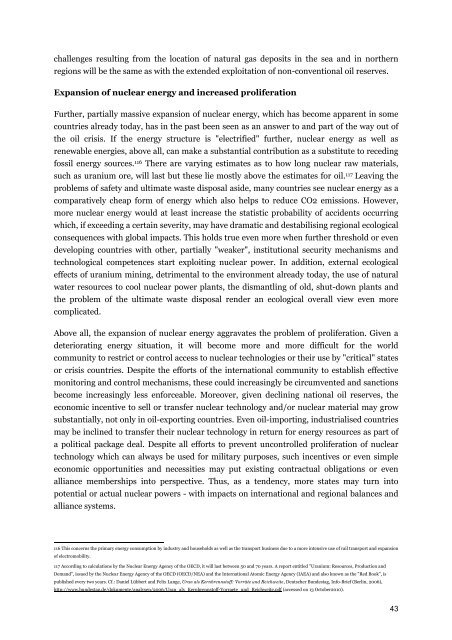PEAK OIL
PEAK OIL
PEAK OIL
Create successful ePaper yourself
Turn your PDF publications into a flip-book with our unique Google optimized e-Paper software.
challenges resulting from the location of natural gas deposits in the sea and in northern<br />
regions will be the same as with the extended exploitation of non-conventional oil reserves.<br />
Expansion of nuclear energy and increased proliferation<br />
Further, partially massive expansion of nuclear energy, which has become apparent in some<br />
countries already today, has in the past been seen as an answer to and part of the way out of<br />
the oil crisis. If the energy structure is "electrified" further, nuclear energy as well as<br />
renewable energies, above all, can make a substantial contribution as a substitute to receding<br />
fossil energy sources. 116 There are varying estimates as to how long nuclear raw materials,<br />
such as uranium ore, will last but these lie mostly above the estimates for oil. 117 Leaving the<br />
problems of safety and ultimate waste disposal aside, many countries see nuclear energy as a<br />
comparatively cheap form of energy which also helps to reduce CO2 emissions. However,<br />
more nuclear energy would at least increase the statistic probability of accidents occurring<br />
which, if exceeding a certain severity, may have dramatic and destabilising regional ecological<br />
consequences with global impacts. This holds true even more when further threshold or even<br />
developing countries with other, partially "weaker", institutional security mechanisms and<br />
technological competences start exploiting nuclear power. In addition, external ecological<br />
effects of uranium mining, detrimental to the environment already today, the use of natural<br />
water resources to cool nuclear power plants, the dismantling of old, shut-down plants and<br />
the problem of the ultimate waste disposal render an ecological overall view even more<br />
complicated.<br />
Above all, the expansion of nuclear energy aggravates the problem of proliferation. Given a<br />
deteriorating energy situation, it will become more and more difficult for the world<br />
community to restrict or control access to nuclear technologies or their use by "critical" states<br />
or crisis countries. Despite the efforts of the international community to establish effective<br />
monitoring and control mechanisms, these could increasingly be circumvented and sanctions<br />
become increasingly less enforceable. Moreover, given declining national oil reserves, the<br />
economic incentive to sell or transfer nuclear technology and/or nuclear material may grow<br />
substantially, not only in oil-exporting countries. Even oil-importing, industrialised countries<br />
may be inclined to transfer their nuclear technology in return for energy resources as part of<br />
a political package deal. Despite all efforts to prevent uncontrolled proliferation of nuclear<br />
technology which can always be used for military purposes, such incentives or even simple<br />
economic opportunities and necessities may put existing contractual obligations or even<br />
alliance memberships into perspective. Thus, as a tendency, more states may turn into<br />
potential or actual nuclear powers - with impacts on international and regional balances and<br />
alliance systems.<br />
116 This concerns the primary energy consumption by industry and households as well as the transport business due to a more intensive use of rail transport and expansion<br />
of electromobility.<br />
117 According to calculations by the Nuclear Energy Agency of the OECD, it will last between 50 and 70 years. A report entitled "Uranium: Resources, Production and<br />
Demand", issued by the Nuclear Energy Agency of the OECD (OECD/NEA) and the International Atomic Energy Agency (IAEA) and also known as the "Red Book", is<br />
published every two years. Cf.: Daniel Lübbert and Felix Lange, Uran als Kernbrennstoff: Vorräte und Reichweite, Deutscher Bundestag, Info-Brief (Berlin, 2006),<br />
http://www.bundestag.de/dokumente/analysen/2006/Uran_als_Kernbrennstoff-Vorraete_und_Reichweite.pdf (accessed on 13 October2010).<br />
43


